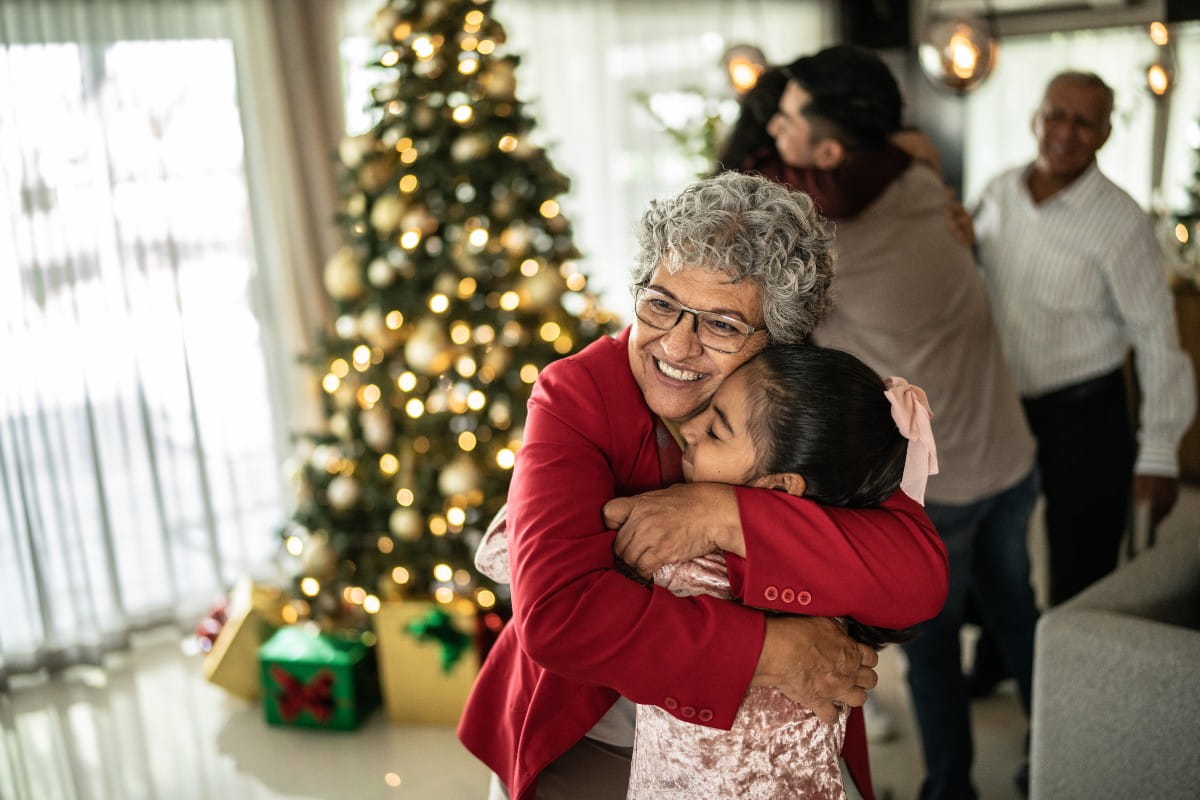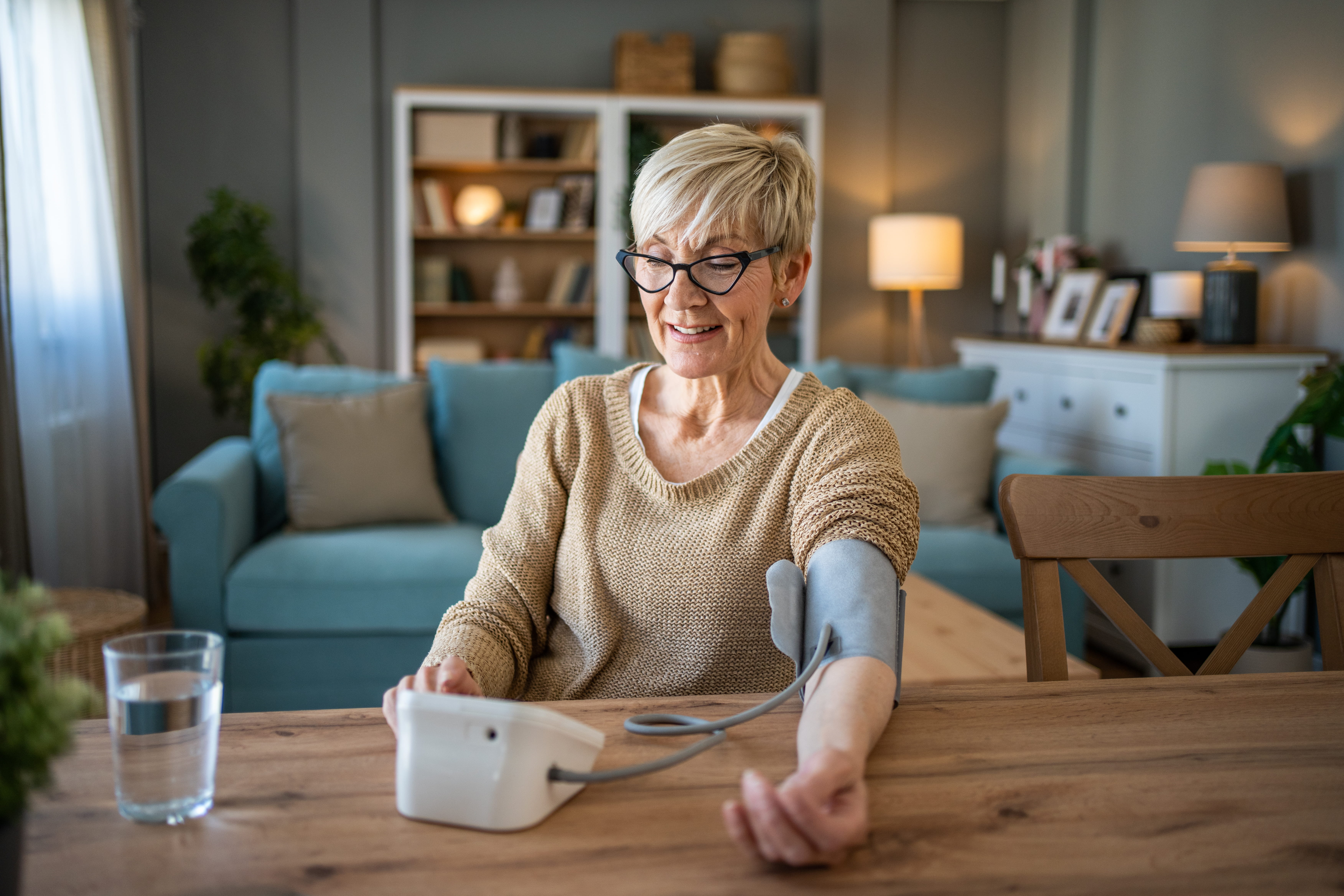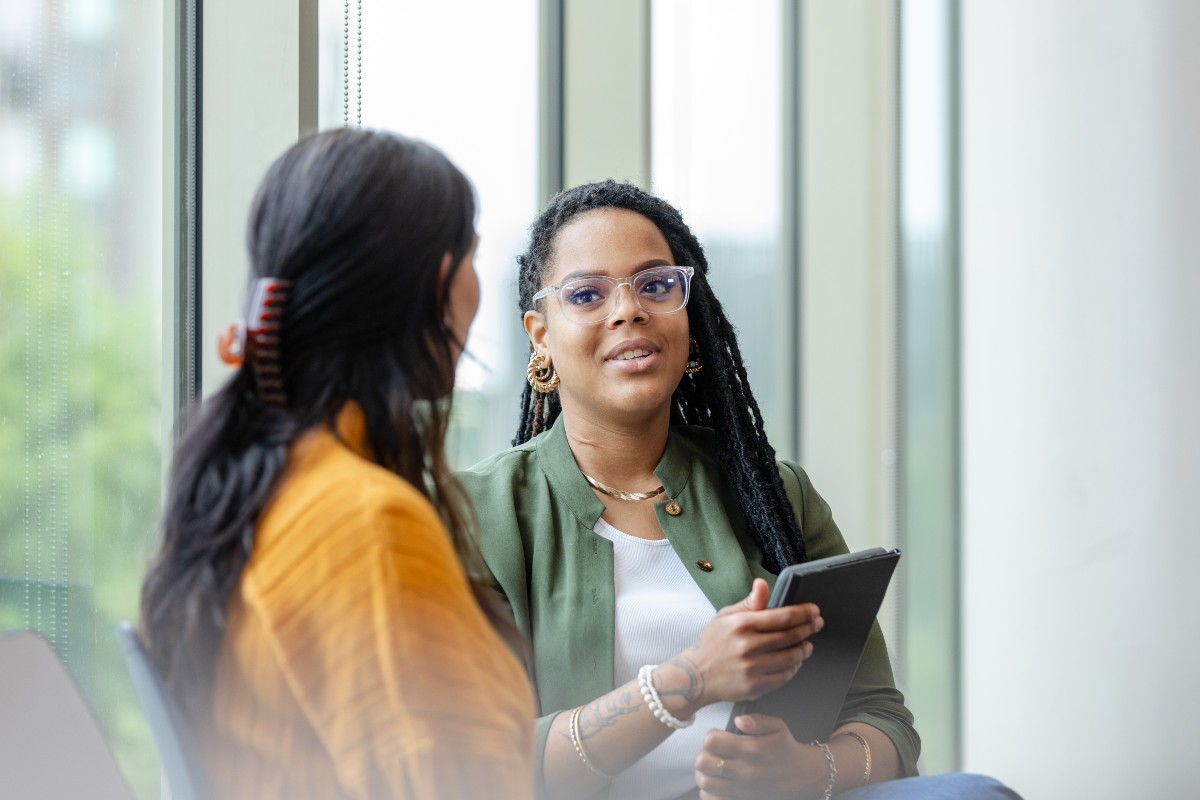Frankye Myers: From Riverside Health System, this is the healthy you podcast where we talk about a range of health-related topics focused on improving your physical and mental health. We chat with our providers, team members, patients, and caregivers to learn more about how to maintain a healthy lifestyle and improve overall physical and mental health. So, let's dive in to learn more about becoming a healthier you.
Frankye Myers: I'm really excited to have with me in the healthy youth studio. Amanda Gotta.
I got that right.
Amanda is the memory care navigator for Riverside. Martha W. Goodson center. Hi.
Amanda Gada: Hi.
Frankye Myers: Well, this episode, we're going to be navigating memory care during the holidays for loved ones with dementia. So, we're going to be talking about that a little bit. All right. Welcome. Always a pleasure to have you here.
Amanda Gada: Thank you. Thank you. Always a pleasure to be here.
Frankye Myers: Yes. We're going to discuss this very important topic today, exploring how to navigate memory care for one thing, during the holidays and for the loved ones, which can be challenging this holiday season. While it brings a lot of joyous. Right. But it can also present unique challenges for the ones caring for individuals with memory impairment.
We're going to explore this important subject with you and then just hear what you feel like are some things that they can do and how to navigate the situation. Amanda, tell me a little bit about how you ended up being a memory care navigator.
Amanda Gada: Okay.
Frankye Myers: And what that is. I know what a navigator is because I can't get anywhere without my navigation.
Amanda Gada: I hear you.
Frankye Myers: I would be lost.
Amanda Gada: So, I graduated with my MSW Master of Social Work in 2001 and really found a passion in social work in the medical field. So, I've been in a variety of settings, outpatient, acute home health care, hospice care. And when an opportunity arose three years ago to come work for Riverside health System as a memory care navigator, I applied, and I'm very excited that I was, you know, chosen to be a memory care navigator. I really feel like it's very important for families to always have a point of contact, to reach out to, no matter what the need is at that very moment. Because with a journey with your loved one with dementia, it's going to change, and it could change quite frequently. And someone that you can always pick up the phone and get resources, get connected to, agencies that you need to be connected, the education, the information, and most importantly, the support for both the loved one that's living with dementia and their family members, caregivers.
No one's journey is the same. So that's what makes it so unique.
And I really try to individualize what it is that that particular individual and their family needs at that moment.
Frankye Myers: And sometimes we don't always talk about that caregiver. So, I'm so glad you reiterated that it's so important that they remain healthy because what happens to that loved one if they don't have that support?
Amanda Gada: Right. The self-care and the healthcare is vital to being able to maintain and getting breaks, knowing your loved one will still be safe, being able to take respite and do the things that are still. That are very important to you. We call it caregivers filling up their cup. What is it that they can do? What activity, what hobby, what passion to fill their cup so then they're more able to be present for their loved one.
Frankye Myers: Yes. And the integration of a navigator. We've heard about it early on in oncology and how complex that diagnoses or navigating an oncological disease can be. I really think that it speaks to Riverside's commitment to care for our community.
Amanda Gada: Absolutely.
Frankye Myers: Like we care for family members, to put that resource in place in other areas so that our communities, our patients and families have that support to walk them through those challenging times.
[00:04:59] Speaker C: Absolutely. Absolutely. It is vital.
Frankye Myers: Yes. Yes. So, we talked a little bit about how important it is to keep that caregiver healthy. And one of those things is them enjoying and being able to celebrate, you know, milestones and holidays.
Amanda Gada: Right.
Frankye Myers: So, talk a little bit about how do they navigate that.
Amanda Gada: So, I think if there are three takeaways, it would be prioritize, you know, what traditions, what dishes, whatever it is that, you know, they feel like they can prioritize, because I think we have a tendency to overdo the holidays. You know, we want to make it special. We want to have 15 different casseroles out for everyone to enjoy. Everyone's favorite, right?
Frankye Myers: Yes.
Amanda Gada: So, I really think it's prioritizing and what is going to bring joy in that holiday celebration? What's going to be meaningful? What tradition or traditions do we need to keep? What do we need to scale down then? I think also adjust and adjust. What is this holiday gathering going to look like or what is this special celebration going to look like?
So, they're not only for them, but their loved one isn't left feeling overwhelmed. Right.
Frankye Myers: And, Amanda, do you think that may also entail embracing that? It may have to be someplace different.
Amanda Gada: It may have to be someplace different. You know, for 30 years, everybody may have traveled to the family home.
It may be that a caregiver may need to gauge, is this going to be too tough on my loved one.
Do they need to be in a familiar setting? The holiday travel is very hectic.
Everybody dreads that, whether you're living with brain change or not. So really looking at what is feasible. What is a feasible plan to have a successful holiday or family celebration?
Frankye Myers: Yes. One of the things that I remember from conversations with Mister Goodson is planning ahead.
And he did a really good job of talking about the environment, importance of that, and going ahead of, and really understanding and navigating the path and identifying any potential triggers or opportunities that may not be good for the person experiencing the memory loss.
Amanda Gada: Absolutely. And I think planning ahead means more than one plan and really talking with other family members ahead of time about what this celebration or this holiday is going to look like for both the caregiver and the loved one. We have all sorts of technology these days, you know, do we need to zoom? Do we need to have a FaceTime? Do we need to have a family phone call?
Do we need to have smaller gatherings, but maybe a couple of them? Because if it is a big extended family celebration, having too many people sometimes can be very overwhelming.
Frankye Myers: Amanda, can you talk a little bit about the importance of having that consistency for someone experiencing memory loss?
Amanda Gada: Yes. Routine is crucial.
And traveling or being in an unfamiliar place may break that routine. And it can be very disorienting and very upsetting to somebody that is living with dementia.
Frankye Myers: Okay.
For someone who may be navigating this for the first time, is there a suggestion that you could give on how to kind of map it out as they come up with a plan to navigate this?
Amanda Gada: Yeah. So, I think first and foremost, really knowing where your loved one is in their journey and gauging what is going to be the best possible scenario? Is it, do we stay home this year and reevaluating that with each upcoming holiday or a milestone celebration or a family celebration?
Because it may be that in the past, the loved one was in a different place. It may be that it may not be the best thing anymore. So, I think really that planning ahead, prioritizing what traditions and then making the adjustments and communicating with family members in advance, letting them know what to expect if they are one of the invited guests. I know it sounds silly, but, you know, the suggestion has even been made that somebody, it could be a familiar face to the individual but wearing a name tag because they may not be able to remember that person's name. They remember their face. The face. Yes, absolutely. Absolutely. Or really, you know, level setting with your other family members ahead of time to say you know, please introduce yourself, you know, if you're not wearing name tags. So, I think it's really having a several different plans in your pocket and then figuring out what's going to work best for your loved one.
Frankye Myers: Absolutely. That's great information.
What are some recommendations you could give caregivers when the plan doesn't work, and it becomes overwhelming.
Amanda Gada: Right. So, I really think having a dedicated, quiet space. So, if your loved one starts to become very overwhelmed or agitated or, you know, you can tell they just feel very uncomfortable or it's not a good situation anymore to have a quiet space. A familiar space, hopefully, or a familiar something along with them where they can go and have a rest break with a familiar face, you know, somebody that would be familiar with them, to sit with them so then they don't feel intimidated or scared.
A favorite activity, a favorite blanket, a favorite photo album, whatever it is that would comfort that individual to have along, whether they're in their own home, their own space, or whether they're in another family member's home.
Frankye Myers: Okay.
All right.
What about long trips and long drives?
I could see how that could be extremely challenging.
Amanda Gada: Yes.
Frankye Myers: If that occurs and you're either on a plane or in a car on a long trip. So what would you suggest in those instances?
Amanda Gada: Right, so unfamiliar surroundings can be very scary.
So really, again, just having something along that comforts them.
Reassuring words.
If it's a car trip that's long, really breaking up that car trip, not trying to do it all in one day.
So frequent rest breaks, trying to keep somebody on their routine even though they're in an unfamiliar place. But meal breaks and sleep schedule, keeping the routine that that loved one is used to would be crucial because they are going to be out of their environment, and that can be very unsettling.
Frankye Myers: Okay, so I get, you know, keep those trips short, right?
Amanda Gada: Yes, absolutely.
Frankye Myers: Familiar items you talked about.
Stick to routines, plan those breaks, and have quiet space.
Amanda Gada: Right?
Frankye Myers: Yes. I know we're talking about adults, but these are some great strategies I can use with my grandmother when those kids are going through like that, some of those different stages, there's certain things that trigger her. If there's people that she's afraid of, for whatever reason, because kids are a blank slate, it's like putting them in unknown environment. So, we've realized that we have to, you know, do that in different phases. Right. And when they're afraid, they're just afraid and you may not understand it.
Amanda Gada: Yes. Yes.
Frankye Myers: All right. Anything else that you would like to just provide our viewers as it relates to what you think would be helpful.
Amanda Gada: So, I think depending on the stage or, you know, where your loved one is with their journey in dementia, trying to involve them in the holiday celebration as much as you can, or the, if they're still really good at wrapping gifts or stuffing cards, maybe it's one favorite recipe that you can do together. Because sometimes when people forget their recipes, that can be very overwhelming as well.
Or they forget the traditions that you did every year.
I also think, please consider different decorations that you use. Decorations may need to be scaled down. If there's too many decorations, maybe a loved one gets overwhelmed. Too many people. A loved one can get quickly overwhelmed thinking about, like, twinkling lights or something. If that creates.
If it creates your loved one to be upset or agitated, think about lights on the tree and maybe not having lights on the tree this year, or ornaments, you know, really trying to stay away from, you know, food decorations or something that would look like food decorations, because that could be really confusing to a loved one depending on where they are in their journey of dementia. I think also trying to consider when it is the holidays, what does gift giving look like?
You know, some families could sit hours on end in a living room and a loved one living with dementia isn't going to be able to tolerate that sort of thing as people exchange gifts and watch everyone unwrap their gifts. Also, considering what gift shopping you're doing, you know, some of the gifts that we've given someone that is now living with dementia could be very overwhelming or scary. So, thinking about things that bring comfort to them. If they like to watch the birds, maybe you consider a bird feeder. They like to have warm, fuzzy blankets. Thinking about warm, fuzzy blankets and that sort of thing. So really kind of thinking, what is it that brings joy in your loved one's life? And I what gift would be most, not only most useful, but not intimidating to them?
Frankye Myers: Sounds like managing our own expectations as well.
Amanda Gada: Absolutely. And the expectations of other family members that may not see them every day and really communicating ahead of time that really, right now, this is where our family member is in their journey, and we have to shift our communication and our approach to meet them where they.
Frankye Myers: Are and create new traditions.
Amanda Gada: New traditions. Or it might be simpler traditions.
Frankye Myers: Yes. Yes. I mentioned self-care.
We have so many resources embedded within our center. I don't know if you want to talk a little bit about that, where caregivers can reach out for additional support. I think that's so important. And we did mention that as well. You know, what are some of the things that they can do to incorporate that well-being while taking care of a family member?
Amanda Gada: Sure. So, we have information and offer support groups for caregivers, memory cafes for folks that are living with dementia and their caregivers to go and enjoy just strictly socialization. It's a wonderful socialization opportunity and really helps connect them with other individuals and caregivers that might be going through very similar things, and then friendships start blossoming. Outside of that, everybody's supporting one another.
Memory care navigators at our center, our staff at our center can connect families with all sorts of different resources, regardless of what community they live in.
I think our local agency on Aging's are crucial, you know, for resource and referral, as well as our partners here within Riverside and in our greater community. So, I think it's really important that, you know, if a loved one or a caregiver is having a difficult time or has questions or doesn't know where to turn to, please reach out to our center. We'll get you connected. And then you would have the ongoing point of contact and support from a memory care navigator.
Frankye Myers: Absolutely. That's great information, Amanda.
Sounds like from listening to you, the importance of family coming together and setting those boundaries and expectations prior to any of those holiday’s events.
Amanda Gada: Definitely.
Frankye Myers: All right, as we wrap up, any final tips? You've just given us so much great information and thank you. Thank you for your commitment. Thank you for all the work that you and your team are doing.
Frankye Myers: Thank you.
Frankye Myers: You're truly making a difference.
Amanda Gada: Thank you.
I would say the one last takeaway that I want caregivers and family members and individuals that are living with dementia is to enjoy.
So if you have to prioritize and simplify, if you need to adjust, then the third would be, absolutely. Try to find a way to enjoy. Let your other family members know when you need to take a break and take a walk.
Have other family members bake that favorite recipe or, you know, bake the holiday baked goods for you. Don't feel like you have to do it all because then you are able to step away and enjoy the moment and make wonderful memories with your loved one. That is walking the journey of dementia.
Frankye Myers: Yes. And be kind to yourself.
Amanda Gada: Be kind to yourself.
Frankye Myers: Give yourself grace.
Amanda Gada: Yes.
Frankye Myers: And I was an event with you a couple years back, and I never forgot this.
The suggestion was to record a message as if a friend had called you and was having trouble what you would say to them, and then to save that message on your tough days and play it back to yourself. Yes, because sometimes we don't always, caregivers don't always give themselves that same grace.
Amanda Gada: Right? And they don't give themselves enough credit.
Frankye Myers: Yes.
Amanda Gada: They're doing what is best in the moment where they are, and sometimes not giving enough credit to yourself or just thinking, I should be doing more, I should be doing this, and patting yourself on the back and knowing that you are doing a wonderful job.
Frankye Myers: Absolutely. They truly are. Thank you so much again, Amanda. Thank you for all the insights you gave our viewers today and even myself. We hope these tips help families create a supportive holiday environment. If you found this episode helpful, please share it with others. Until next time, take care.
Frankye Myers: Thank you for listening to this episode of Healthy Youth. We're so glad you were able to join us today and learn more about this topic. If you would like to explore more, go to riversideonline.com.



